
This pressbook is an introduction to sociology.
- Subject:
- Social Science
- Sociology
- Material Type:
- Textbook
- Provider:
- Achieving the Dream
- Author:
- Florida State College at Jacksonville
- Date Added:
- 05/19/2021

This pressbook is an introduction to sociology.

Sociology is the study of social groups, structures, processes, institutions, and events. This course will focus on understanding and applying the sociological perspective, which stresses the importance of the impact of social forces external to the individual in shaping peopleęs lives and experiences. This idea that we are all profoundly affected by the society in which we live is the guiding light of sociology. Sociologists also study the ways in which people, as they interact, shape their social systems. Topics studied will include socialization, social interaction, culture, groups, social structure, deviance, social inequality, social class, race, gender, institutions (political, economic, educational, family, and religious), collective behavior and social change. Students will be asked to learn the basic concepts, theories, and perspectives of sociology, to see how these operate in terms of social processes, structures, and events, and to apply this knowledge to better understand the social world.

"Let’s Talk About Suicide: Raising Awareness and Supporting Students" includes a facilitator’s guide with handouts and a PowerPoint presentation. This adaptable resource offers a sensitive, respectful, and detailed training on suicide awareness and response. It can be used for two-hour synchronous training or for self-study.

This textbook is a massive long term collaboration between sociologists who want to lessen the cost of higher education for students like you. This book is originally written by a sociologist at the University of Maine, and the textbook publisher for his many other books doesn’t want his name associated with free work… frustrating but not surprising. The sociology faculty at Lansing Community College secured an editable version and worked to provide a more current version in 2018. Their data analysis from the 2016 General Social Survey and from the Standard Cross-Cultural Sample is included in the text. Then in 2020 the sociology faculty at Delta College produced the online version of the book, updated the Census Data to the most recent 2018 American Community Survey and updated the 2017-2020 data from the World Values Survey. Additional editing for readability, a global to local focus, and modern context is underway. This text is a work in progress, and your questions and feedback make it more relevant and relatable.

This version is modified and adapted for use at NSCC in the School of Access. Connie McPherson adapted the textbook, Introduction to Sociology – 2nd Canadian Edition, to more closely match the outcomes taught at NSCC with input from other instructors who teach in the School of Access. Introduction to Sociology – 2nd Canadian Edition was adapted by William Little from the OpenStax College textbook, Introduction to Sociology. For information about what was changed in this adaptation, refer to the Copyright statement at the bottom of the home page. This adaptation is a part of the B.C. Open Textbook project.
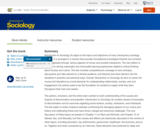
Introduction to Sociology Textbook which covers all main topic modules. Recently updated.

The author of Principles of Sociological Inquiry: Qualitative and Quantitative Methods, Amy Blackstone, started envisioning this textbook while sitting in her own undergraduate sociology research methods class. She enjoyed the material but wondered about its relevance to her everyday life and future plans (the idea that one day she would be teaching such a class hadn't yet occurred to her).
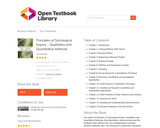
Principles of Sociological Inquiry: Qualitative and Quantitative Methods provides balanced coverage of qualitative and quantitative approaches by integrating a variety of examples from recent and classic sociological research. The text challenges students to debate and discuss the strengths and weaknesses of both approaches.
Finally, one of the most important goals of Principles of Sociological Inquiry: Qualitative and Quantitative Methods is to introduce students to the core principles of social research in a way that is straightforward and engaging. As such, the text reflects public sociology’s emphasis on making sociology accessible and readable.
Table of Contents:
Chapter 1: Introduction
Chapter 2: Linking Methods With Theory
Chapter 3: Research Ethics
Chapter 4: Beginning a Research Project
Chapter 5: Research Design
Chapter 6: Defining and Measuring Concepts
Chapter 7: Sampling
Chapter 8: Survey Research: A Quantitative Technique
Chapter 9: Interviews: Qualitative and Quantitative Approaches
Chapter 10: Field Research: A Qualitative Technique
Chapter 11: Unobtrusive Research: Qualitative and Quantitative Approaches
Chapter 12: Other Methods of Data Collection and Analysis
Chapter 13: Sharing Your Work
Chapter 14: Reading and Understanding Social Research
Chapter 15: Research Methods in the Real World

Rothschild’s Introduction to Sociology was adapted by Dr. Teal Rothschild from the OpenStax College textbook, Introduction to Sociology 2e, which is licensed under a CC-BY license. The original textbook for OpenStax can be found here: https://openstax.org/details/books/introduction-sociology-2e
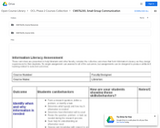
This course is designed to familiarize you with the major theory and research surrounding the study of small group communication and provide an opportunity to analyze and develop solutions to a community problem while working in a small group.
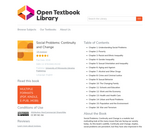
Social Problems: Continuity and Change by Steve Barkan is a realistic but motivating look at the many issues that are facing our society today. As this book’s subtitle, Continuity and Change, implies, social problems are persistent, but they have also improved in the past and can be improved in the present and future, provided that our nation has the wisdom and will to address them.
It is easy for students to read a social problems textbook and come away feeling frustrated by the enormity of the many social problems facing us today. Social Problems: Continuity and Change certainly does not minimize the persistence of social problems, but neither does it overlook the possibilities for change offered by social research and by the activities of everyday citizens working to make a difference. Readers of Steve Barkan’s book will find many examples of how social problems have been improved and of strategies that hold great potential for solving them today and in the future.
You will find several pedagogical features help to convey the “continuity and change” theme of this text and the service sociology vision in which it is grounded: Each chapter begins with a “Social Problems in the News” story related to the social problem discussed in that chapter. These stories provide an interesting starting point for the chapter’s discussion and show its relevance for real-life issues. Three types of boxes in each chapter provide examples of how social problems have been changed and can be changed.

Every society faces problems that are more than just individual troubles. In this course we will use a sociological perspective to critically examine the bases of social inequality and the resultant problems in society. We will explore concerns related to families, education, the workplace, the media, poverty, crime, drug abuse, health issues, war and terrorism, the environment and global concerns. We will also look at social action and possible solutions to these problems through both individual and community efforts.
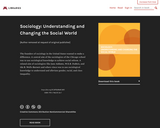
The founders of sociology in the United States wanted to make a difference. A central aim of the sociologists of the Chicago school was to use sociological knowledge to achieve social reform. A related aim of sociologists like Jane Addams, W.E.B. DuBois, and Ida B. Wells-Barnett and others since was to use sociological knowledge to understand and alleviate gender, racial, and class inequality.
Steve Barkan’s Sociology: Understanding and Changing the Social World makes sociology relevant for today’s students by balancing traditional coverage with a fresh approach that takes them back to sociology’s American roots in the use of sociological knowledge for social reform.
Print on demand edition available here: https://www.uncpress.org/book/9781469659282/sociology/
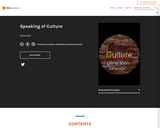
The purpose of Speaking of Culture is to define culture and many other concepts associated with it. My hope is that the readings in this book will help you to better understand the breadth of the concept of culture and provide you with a vocabulary for discussing it more articulately.
Culture is one of those broad concepts that is used widely, although somewhat imprecisely, in everyday English. It also cuts across many academic disciplines, and this book draws on many of them. It touches, for instance, on anthropology, biology, history, mythology, political science, psychology, and sociology.

This lesson is connected to but can be used independently of "Using Big Data to Identify and Understand Educational Inequality in America (1)"
Students will develop CS skills and behaviors including but not limited to: learning what an API is, learning how to access and utilize data on an API, and developing their R coding skills and knowledge. Students will also learn basic, but important, sociological principles such as how poverty is related to educational opportunities in America (and how this relationship varies between and among states). Although prior knowledge of CS and sociology is helpful, neither is necessary for student (or instructor) success on this project. Three instructional hours.

This is the first of two lessons/labs for teaching and learning of computer science and sociology. Either and be used on their own or they can be used in sequence, in which case this should be used first.
Students will develop CS skills and behaviors including but not limited to: learning what an API is, learning how to access and utilize data on an API, and developing their R coding skills and knowledge. Students will also learn basic, but important, sociological principles such as how poverty is related to educational opportunities in America. Although prior knowledge of CS and sociology is helpful, neither is necessary for student (or instructor) success on this two-week project. Three instructional hours per week (total of six hours over two weeks).

Pre-history to the Wars of Religion, a period extending from 10,000 BCE to 1648 CE. Includes transition from pre-historic to the historic period, Greco-Roman world, Early, Central, and Late Middle Ages, and Renaissance and Reformation.
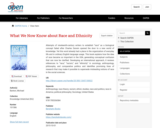
Attempts of nineteenth-century writers to establish “race” as a biological concept failed after Charles Darwin opened the door to a new world of knowledge. Yet this word already had a place in the organization of everyday life and in ordinary English language usage. This book explains how the idea of race became so important in the USA, generating conceptual confusion that can now be clarified. Developing an international approach, it reviews references to “race,” “racism,” and “ethnicity” in sociology, anthropology, philosophy, and comparative politics and identifies promising lines of research that may make it possible to supersede misleading notions of race in the social sciences.